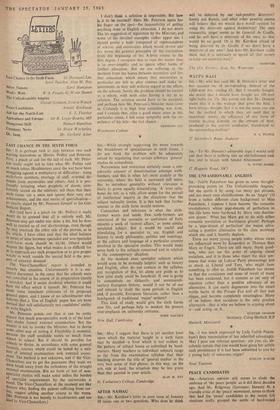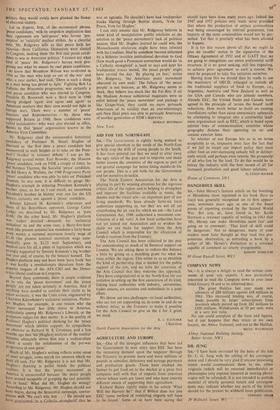PEACE CANDIDATES
SLR.—American opinion still seems to elude the embrace of 'the peace people' as it did three decades ago. And Mr. Ridgeway (Spectator, January 4), a friendly critic of the 'peace' movement, seems to think that had the 'peace' candidates in the recent US elections really grasped the nettle of hard-nosed
politics, they would surely have plucked the flower of electoral victory.
Let us dispose, first, of the nonsensical phrase, `peace candidates,' with its unspoken implication that their opponents are 'anti-peace' who favour 'pre- emptive' or 'catalytic' nuclear strikes. As a cheerful note, Mr. Ridgeway tells us that peace hath her victories—three California Democrats were elected to Congress, making them `the first real peace candi- dates to win in American politics.' 1 cannot say what kind of 'peace' Mr. Ridgeway's heroes were pro- Posing nor what he means by real peace candidates. I do know that Woodrow Wilson was re-elected in 1916 as 'the man who kept us out of the war' and who, a year earlier, had said, 'There is such a thing as a man being too proud to fight.' Fighting Bob La Follette, the Wisconsin progressive, was certainly a real peace candidate who was elected to Congress. Franklin D. Roosevelt won a third term in 1940 having pledged 'again and again and again' to American mothers that their sons would not fight in foreign wars. There were a number of 'peace' Senators and Representatives — by those who supported Britain in 1940, these candidates were called isolationists—who were also elected to office, thanks to that 'peace' organisation known as the America First Committee.
Mr. Ridgeway cited the unsuccessful Senatorial candidacy of Professor H. Stuart Hughes of Harvard as 'the first time a peace candidate has manoeuvred to such heights as to take on the Presi- dent's ' brother in national debate.' 1 can go Mr. Ridgeway several better. Earl Browder, the Moscow peace' candidate, took on FDR a couple of times. So did Norman Thomas, the Socialist 'peace' candidate. So did Henry A. Wallace, the 1948 Progressive Party Peace' candidate who was able `to take on' President Truman. In any case, it is difficult to gauge Mr. Hughes's triumph in debating President Kennedy's brother since, as far as I can recall., no incumbent President's brother in history ever ran for the US Senate, certainly not against a 'peace' candidate.
Senator Edward M. Kennedy's utterances and those of his Republican opponent, George Cabot Lodge, are described by Mr. Ridgeway as 'pure froth.' On the other hand, Mr. Hughes's platform was 'rather detailed'—demands for 'unilateral initiatives' to end the arms race; a thirty-five-hour Week (the present national law mandates a forty-hour work week); a national minimum hourly wage of $1.50 (the present national minimum wage auto- matically goes to 51.25 next September); and medical care for all, a piece of legislation which was strongly supported by Senator Kennedy's big brother last year and, of course, by the Senator himself. The Hughes platform may not have been 'pure froth' but it was hardly a revolutionary departure from the Popular slogans of the AFL-CIO and the Demo- cratic-liberal coalition in Congress.
Beyond these comments, there is ample evidence as to why the `peace movement' and the 'peace people' are not taken seriously in America. And it anything were needed to confute their claim to be taken seriously, it was the Cuba crisis, engineered by Chairman Khrushchev's unilateral initiatives. Profes- sor Hughes, for /example, is one reason why the Peace movement' has little status in America, particularly among Mr. Ridgeway's Liberals, or the Profanum vulgus for that matter. It is the quality of Professor Hughes's political thinking for the 'peace Movement' which inhibits support. As sympathetic an observer as Richard H. S. Crossman said a few months ago that 'his [Hughes] analysis of the nuclear dilemma ultimately drives him into a unilateralism Which is surely the isolationism of the pre-war Progressive in new guise.' Much of Mr. Hughes's writing reflects some sense of inner struggle, some search for answers which we Must all seek. For Mr. Ridgeway it is not that Mr. Hughes's thinking is pallid beside the political realities. It is that the 'peace movement' in America is unsuccessful because 'the peace people have seemed incapable of grasping the real possibili- ties at hand.' What did Mr. Hughes do wrong? According to Mr. Ridgeway, Mr. Hughes should not have begun, during the Senatorial campaign, conver- sations with 'We can't win, but . . .' He should not have .41rociaimed 9n a Catholic...stronghold' that he
was an agnostic. He shouldn't have had loudspeaker trucks blaring through Boston streets, 'Vote for Peace, Vote for Hughes.'
I can only assume that Mr. Ridgeway believes in some kind of manipulative public relations as the solution to the 'peace movement's' lack of political success. Had Mr. Hughes insisted he could win, the Massachusetts electorate might have been infected with his Coueism. Had he somehow become.informed by a hitherto invisible institutional devotion to God (how much good a Protestant conversion would do 'in a Catholic stronghold' is hard to say) and kept his loudspeaker trucks muted, 'the peace people' might have carried the day. 'By playing on fear,' writes Mr. Ridgeway, 'the American peace movement obscured its own ends.' The failure of 'the peace people' is not because, as Mr. Ridgeway seems to think, they behave too much like the Fat Boy. 1.1 all the Madison Avenue subliminal magicians were to enlist behind the 'peace movement' and package it like Grape-Nuts, they could no more persuade Americans of its validity than an overwhelmingly anti-New Deal press was able to persuade Americans of another generation of FDR's depravity. -



































 Previous page
Previous page